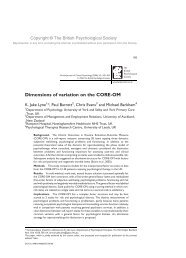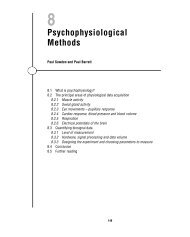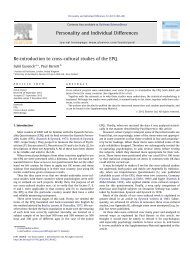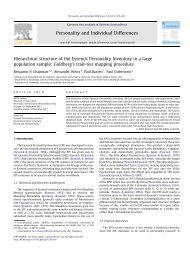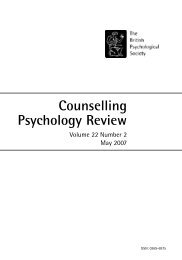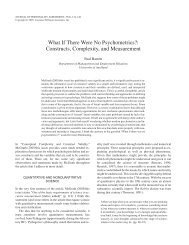Evidence-based IO psychology
Evidence-based IO psychology
Evidence-based IO psychology
You also want an ePaper? Increase the reach of your titles
YUMPU automatically turns print PDFs into web optimized ePapers that Google loves.
5. There is a demand for evidence‐<strong>based</strong> practice from clients and customers. Many of our major clients<br />
are those working at mid to senior levels in HRM. HRM is not a field that has embraced the notion of<br />
evidence <strong>based</strong> practice in any significant way. Although, of course, managers do not actively seek to<br />
purchase ineffective I–O <strong>psychology</strong> products or services, they are under pressure to meet certain shorter<br />
term goals. They may therefore come to depend on a general impression that particular products or<br />
techniques ‘‘work’’ rather than whether they will work in their specific context given the problem they are<br />
trying to solve. HRM departments may also lean on benchmarking or mimicry by adopting the same I–O<br />
<strong>psychology</strong> practices already used by their more successful competitors. The authors have also heard<br />
many times from I–O psychologists who say they wish to practice in an evidence‐<strong>based</strong> way but that<br />
clients have often already decided what they want (e.g., assessment centers, training programs, and<br />
employee attitude surveys) and are asking the I–O psychologist as a technical specialist to deliver it. This<br />
situation suggests that our clients are not demanding an evidence‐<strong>based</strong> approach in the sense discussed<br />
here, although h they are of course interested t din adopting practices they bli believe to be effective.<br />
6. Practice decisions are integrative and draw on the four sources of information and evidence described<br />
above. This is the most difficult characteristic of evidence‐<strong>based</strong> practice to assess without access to<br />
numerous observations of what practicing I–O psychologists actually do. In addition, it may be that as<br />
discussed above, we are not the decision makers; instead, we play an advisory role, providing information<br />
and interpretations to the decision makers... We are likely to look for and use evidence from the local<br />
context and attempt some initial assessment of the problem or situation and seek out organizational data<br />
that might help with problem diagnosis. The use of practitioner experience and judgment seems highly<br />
likely, particularly if the problem or technique is one we have encountered frequently before.<br />
7. Initial training and continuing professional development (CPD) in evidence‐ <strong>based</strong> approaches. Training<br />
in I–O <strong>psychology</strong> master’s degrees and doctorates tends to be of the fairly traditional academic variety<br />
where students are expected in a relatively passive way to learn and retain information. We note that in<br />
both the United States and Britain, the majority of practicing I–O psychologists have terminal master’s<br />
degrees. The typical master’s program in the field has no required supervised internships and does not<br />
train its students to conduct literature searches on practice topics let alone systematic reviews. The forms<br />
of CPD used by S<strong>IO</strong>P and other I–O <strong>psychology</strong> professional bodies also tend to be fairly traditional. In fact,<br />
some of these forms of CPD reverse the approach adopted by evidence‐<strong>based</strong> practice in that they<br />
present participants with recent research findings, evidence, or new techniques and then discuss how<br />
they might be used in practice rather than starting with practice problems and then searching for and<br />
evaluating the evidence that may hl help solve the problem.<br />
5



